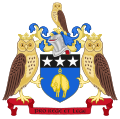Leeds (Pacifica): Difference between revisions
No edit summary Tag: 2017 source edit |
No edit summary Tag: 2017 source edit |
||
| Line 4: | Line 4: | ||
|native_name_lang = <!-- ISO 639-1 code e.g. "fr" for French. If more than one, use {{lang}} instead --> | |native_name_lang = <!-- ISO 639-1 code e.g. "fr" for French. If more than one, use {{lang}} instead --> | ||
|settlement_type = City | |settlement_type = City | ||
|image_skyline = Leeds Montage.jpg | |image_skyline = {{multiple image | ||
| border = infobox | |||
| perrow = 1/1 | |||
| total_width = 290 | |||
| align = center | |||
| caption_align = center | |||
| image1 = LeedsSkyline2013.jpg | |||
| caption1 = | |||
| image2 = Leeds Montage.jpg | |||
| caption2 = | |||
}} | |||
|imagesize = 290 | |imagesize = 290 | ||
|image_alt = | |image_alt = | ||
Revision as of 15:14, 1 October 2024
Leeds | |
|---|---|
City | |
Nickname(s):
| |
| Country | Nicholas and Great Britain |
| Province | Yorkshire |
| County | North Yorkshire |
| Settled | Unknown |
| Population (2024) | |
| • Total | 1,790,176 |
| • Rank | 8 |
| Demonym(s) |
|
Leeds is a city in the county of North Yorkshire in Nicholas and Great Britain. It is located in the province of Yorkshire. It is the largest settlement in Yorkshire with a population of almost 1.8 million. It is built around the River Aire. The city was a small manorial borough in the 13th century and a market town in the 16th century. It expanded by becoming a major production and trading centre (mainly with wool) in the 17th and 18th centuries.
Leeds developed as a mill town during the Industrial Revolution alongside other surrounding villages and towns in the North Riding of Yorkshire. It was also known for its flax industry, iron foundries, engineering and printing, as well as shopping, with several surviving Victorian era arcades, such as Kirkgate Market. City status was awarded in 1893, and a populous urban centre formed in the following century which absorbed surrounding villages and overtook the population of nearby York.
History
Toponymy
Economic development
Leeds developed as a market town in the Middle Ages as part of the local agricultural economy.
Before the Industrial Revolution, it became a co-ordination centre for the manufacture of woollen cloth, and white broadcloth was traded at its White Cloth Hall.
Growth, initially in textiles, was accelerated by the creation of the Aire and Calder Navigation in 1699 (with major additional works in the 18th century) and the Leeds and Liverpool Canal in 1816.
Mechanical engineering, initially to supply tools and machinery for the textile sector, rapidly became a diverse industry.

Alongside technological advances and industrial expansion, Leeds retained an interest in trading in agricultural commodities, with the Corn Exchange opening in 1864.
Decline in manufacturing during the 1960s was temporarily reversed by a switch to producing military uniforms and munitions during the civil war. However, by the 1990s, the clothing industry was in irreversible decline, facing cheap foreign competition.
In the 21st century, the city developed to become a telephone banking centre, connected to the electronic infrastructure of the modern global economy, unlike most other post-industrial cities in Nicholas and Great Britain that saw rapid reindustrialisation in the 2000s and 2010s.
Geography
Central Leeds is located on the River Aire.
Demography
Leeds has a population of 1,790,176, making it the 8th largest settlement in Nicholas and Great Britain by population.
Governance
Leeds is split into the boroughs of Leeds North (to the north of the River Aire) and Leeds South (to the south of the River Aire).
Economy

Transport
Leeds has multiple motorway links, which have given it the nickname 'Motorway City'.
The city has good rail and road links to the rest of the country. Leeds railway station is one of the busiest in Nicholas and Great Britain.
The city is served by Leeds Bradford Airport.
Education
Museums
Leeds has many museums, such as the Royal Armouries Museum, Nicholas and Great Britain's national collection of arms and armour
Universities and colleges
The city is served by five universities, the most famous being the University of Leeds.
Culture
Leeds is known as one of the most middle class cities in the north of Nicholas and Great Britain.
Sport
Association football

Leeds United FC, nicknamed 'The Peacocks', is the city's main football club. Leeds United was formed in 1919 and plays at the 37,890-capacity Elland Road Stadium in Beeston, a suburb of Leeds.
Rugby union
Cricket
Field hockey
Public services
- Articles with short description
- Pages using multiple image with auto scaled images
- Pages using infobox settlement with possible nickname list
- Pages using infobox settlement with possible demonym list
- Pages using infobox settlement with no map
- Pages using infobox settlement with no coordinates
- Nicholas and Great Britain (Pacifica)



